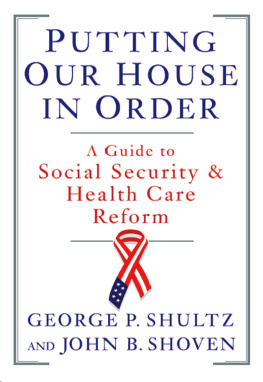HEALTH CARE POLICY IN THE UNITED STATES
edited by
JOHN G. BRUHN
P ENNSYLVANIA S TATE U NIVERSITY - H ARRISBURG
Health Care Policy in the United States
John G. Bruhn, editor
Physician Participation in Medicaid Managed Care
Sunday E. Ubokudom
Healing the Social Body: A Holistic Approach to Public Health Policy
Elizabeth R. Mackenzie
Directing Health Messages toward African Americans: Attitudes toward Health Care and the Mass Media
Judith L. Sylvester
Gender Justice and the Health Care System
Karen L. Baird
Who Cares for Poor People? Physicians, Medicaid, and Marginality
Margaret M. Hynes
First published 1998 by Garland Publishing, Inc.
This edition first published in 2021 by Routledge
605 Third Avenue, New York, NY 10017
and by Routledge
2 Park Square, Milton Park, Abingdon, Oxon OX14 4RN
Routledge is an imprint of the Taylor & Francis Group, an informa business
Copyright 1998 Judith L. Sylvester
All rights reserved. No part of this book may be reprinted or reproduced or utilised in any form or by any electronic, mechanical, or other means, now known or hereafter invented, including photocopying and recording, or in any information storage or retrieval system, without permission in writing from the publishers.
Notice:
Product or corporate names may be trademarks or registered trademarks, and are used only for identification and explanation without intent to infringe.
Publishers Note
The publisher has gone to great lengths to ensure the quality of this reprint but points out that some imperfections in the original copies may be apparent.
Disclaimer
The publisher has made every effort to trace copyright holders and welcomes correspondence from those they have been unable to contact.
Library of Congress Cataloging-in-Publication Data
Sylvester, Judith L.
Directing health messages toward African Americans : attitudes toward health care and the mass media I Judith L. Sylvester.
p. cm. (Health care policy in the United States)
Includes bibliographical references and index.
ISBN 0-8153-3051-0 (alk. paper)
1. Afro-AmericansHealth and hygiene. 2. Health atti
tudesUnited States. 3. Afro-AmericansAttitudes. 4. Mass
media in health educationUnited States. 5. Afro-Americans and
mass media. 6. Medical careUnited StatesMarketing. I. Title.
II. Series: Health care policy in the United States (New York, N.Y.)
[DNLM: 1. BlacksUnited States. 2. Health Services Accessi
bilityUnited States. 3. Marketing of Health Servicesmethods.
4. Mass Media. WA 300 S985d 1997]
RA448.5.N4S95 1997
362.108996073dc21
DNLM/DLC
for Library of Congress
97-42742
ISBN 13: 978-1-03-216539-4 (hbk)
ISBN 13: 978-1-03-216686-5 (pbk)
ISBN 13: 978-1-00-324920-7 (ebk)
DOI: 10.4324/9781003249207
Dedication
For enduring from beginning to end, this book is dedicated to Jim, Jennifer, and Janelle Sylvester and to my parents, Nadine and Everett Smith, who have supported me in more ways than one.
List of Tables
Preface
Since the research for this book was completed in 1995, the Clinton Health Security Act of 1993 has vanished. The proposed comprehensive benefits that were to be guaranteed to every American never materialized. Pres. Clinton was never able to present an acceptable way to pay for the system, and Hillary Rodham Clinton, who spearheaded health care reform was relegated back to nearly invisible First Lady status.
After the Clinton plan failed, the health care issues flowed from a comprehensive river into specific-issue tributaries. When Congress takes up health care issues today, the debate is more likely to be about late-term abortion, Medicare reform, or tobacco and smoking regulations. Minority health careespecially preventive health carehas not become part of the national debate and likely will not do so during the 20th Century.
Congress passed a bill banning the so-called partial birth abortion procedure in 1996, but Clinton vetoed it because the bill would not allow the procedure to be used to protect a womans health. Congress likely will make another attempt at passage before 1999.
Medicare, long considered a political sacred cow, has succumbed to the need for Congress and Pres. Clinton to balance the budget, eliminate waste and abuse and prevent Medicare from going broke in 2001. In response to an estimated $23 billion a year in waste and abuse, Congress has proposed raising the Medicare eligibility age from 65 to 67 in 2027, increasing premiums paid by upper-income seniors and strengthening Medicares fraud and waste-busting powers. The plan also means that more elderly Americans will get their health care through health maintenance organizations and other managed care plans. Current estimates are that only about 13 % of Medicare beneficiaries are in managed care plans.
What the impact of less Medicare and more managed care will be on the poorest people in American society has yet to be determined, but a recent government report found marketing abuses among Florida HMOs, such as sales staff targeting illiterate beneficiaries. Undoubtedly, minorities at the bottom of the socioeconomic scale are the most vulnerable if abuses in the system are not identified and prevented.
There are some positive signs in spite of the lack of national health care reform. More media attention has been focused on black health care issues, mostly the discrepancy of death rates from breast cancer between black and white women. Some articles in womens magazines now specifically mention the increased risk for black women when breast cancer and AIDS are discussed.
The national obsession with low fat diets and exercise has continued, although little information about diet and exercise is specifically targeted toward black Americans. (Where are the black Jane Fondas, Kathy Irelands and Bodies by Jake?) Still, a recent survey (conducted by the author) of college students in Baton Rouge, LA, does indicate that young blacks are less likely than their white counterparts to smoke. This is in spite of a great deal of advertising that has been aimed directly at them. Additionally, President Clinton has moved to regulate tobacco through the Food and Drug Administration and appears to have been successful in getting concessions from the tobacco industry that will restrict many forms of advertising aimed at young people.
Political correctness and research on black health care issues have clashed in a way that the research in this book perhaps could have predicted. The Wall Street Journal reported on a controversy that arose when Memorial Sloan-Kettering Cancer Center conducted a survey as part of a larger breast-cancer research project. Dozens of black women in New York were asked questions that seemed to critics to be unrelated to health care. They were asked questions such as:
- Do you believe in voodoo?
- Do you trust root doctors?
- Do you feel most white people are racist?
- Do you eat chitlins once in a while?
To researchers who understand there can be differences between black and white cultures, these questions are acceptable, even necessary. However, critics found the survey to be racially insensitive. Marshall England, chairman of Harlem Hospitals community advisory board was quoted as saying:






